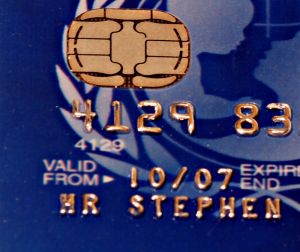by Yolander Prinzel

I have a super simple plan for you that will help you get disciplined about retirement, tax and emergency savings. It’s so easy, even a nano-armored baboon could do it.
Of course, being easy in execution does not mean it’s doable without discipline. You have to want to save in order for this to work.
1. Set up a personal savings account.
2. Set up a business savings account.
3. Set up a SEP IRA through Scottrade, Ameritrade, Schwaab, whatever.*
4. Whenever you receive a Paypal payment from a client, transfer 5% from Paypal directly into your personal savings, 15-20% (depends on your tax bracket and deductions) from Paypal directly into your business savings to cover taxes, and up to 25% (not to exceed $49K total or 20% of profits for Sole Proprietors and LLCs) into your SEP (you may need to transfer to a bank account first, but don’t let that distract you from your ultimate goal).
5. When you get a check for payment from a client, deposit it into your business account and then make the same allocations as above.
6. Live on the remaining 50-75% of your income.
Now, how hard it that? And if you balk at saving 25-50% of your income, then you have some serious thinking to do.
- If your roof leaks, pet, self or spouse gets sick, car breaks down, air conditioner breaks, etc. you will need some savings to fall back on.
- If you plan to ever retire, you’ll need some retirement savings to support you.
- If you would like to keep the IRS happy, you need some tax money set aside.
*Please remember that an IRA is not an investment in itself–it is just an account that allows investments to grow on a tax-deferred or tax-free (ROTH) basis. After you deposit money into your IRA, you will need to use the money to buy equities, bonds, annuities, mutual funds or CD’s.
Yolander Prinzel, ACS is a financial writer as well as a series 7, 66 and 2-15 licensed financial representative. With a decade of financial industry experience, she was the National Director of Marketing and the Director of Operations for The Compass Agency USA and has also been a trader for Raymond James Financial Services and a life insurance underwriter. No matter what you may think, none of her posts are advisory, they are simply informational. Only an advisor with close, personal knowledge of your financial situation can offer advice.





 Before I launch into this, understand that no single freelancer experience triggered my urge to write this entry. Instead it comes at the realization that every single freelancer I have ever hired has made some of these mistakes. 99% of the time, they are completely avoidable.
Before I launch into this, understand that no single freelancer experience triggered my urge to write this entry. Instead it comes at the realization that every single freelancer I have ever hired has made some of these mistakes. 99% of the time, they are completely avoidable.